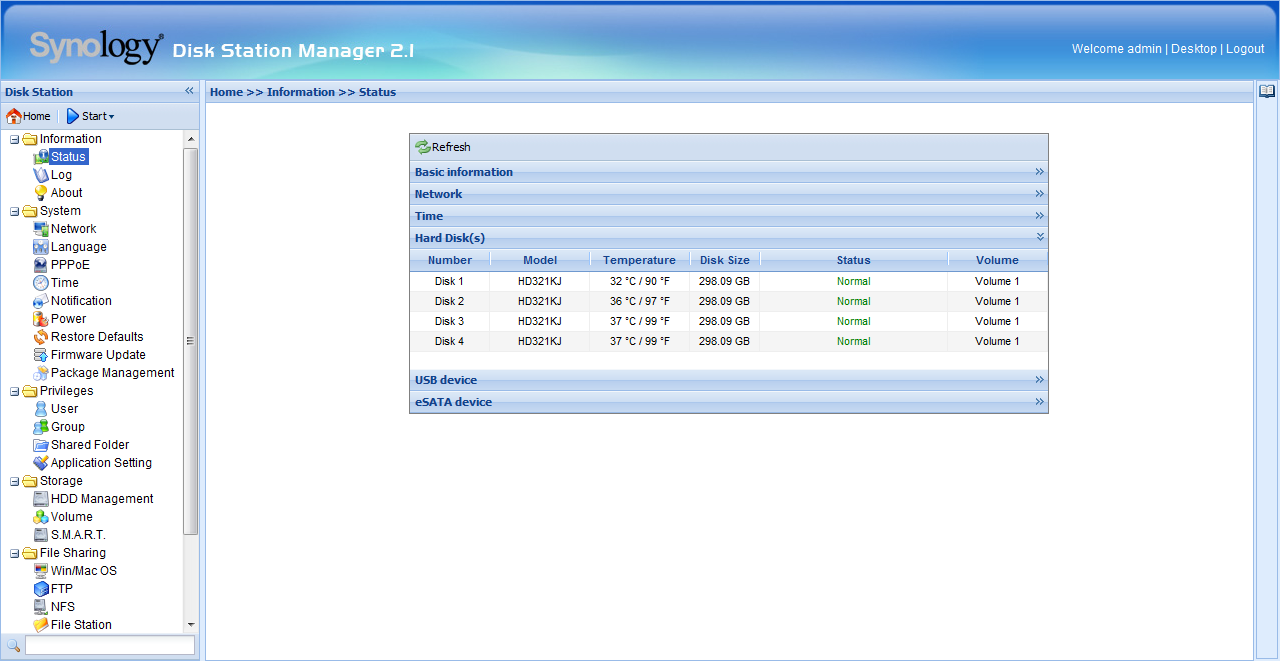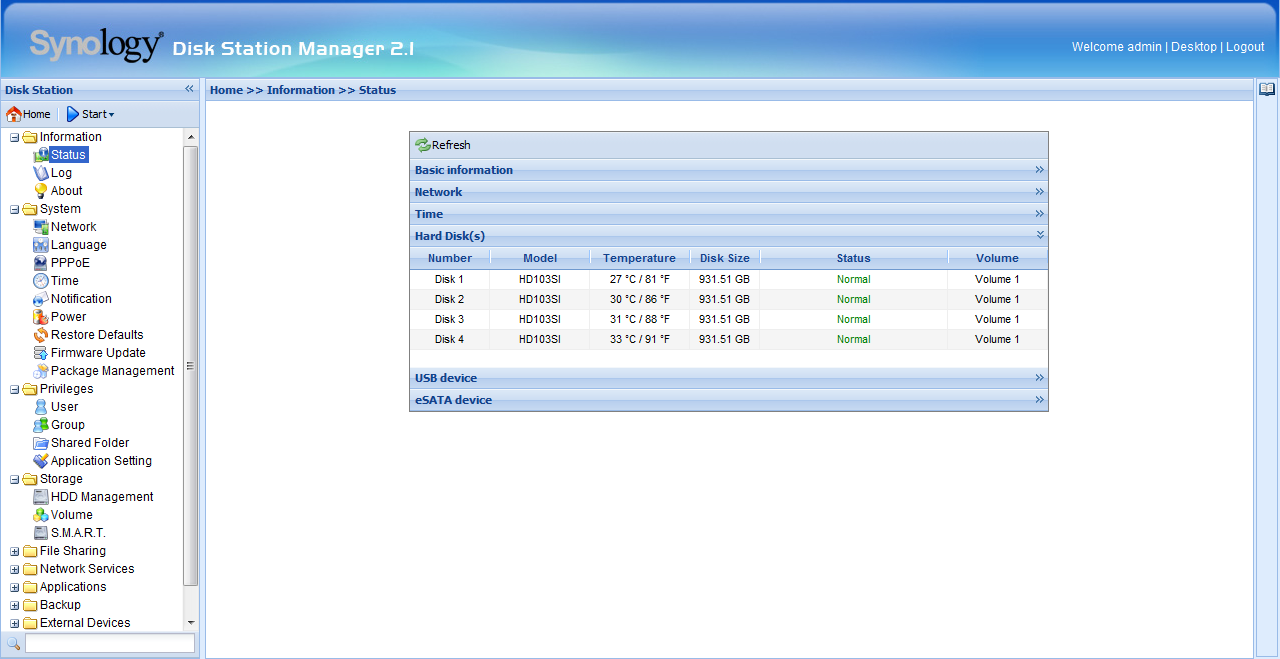Picking A Hard Drive For Your NAS: New Green Beats Old Speed
Comparing Temperatures And Power Consumption
To compare power consumption, we looked at the entire system, equipping our Synology DS409+ with four Samsung HD321KJ (320GB T166) or four Samsung HD103SI (1TB F2 EcoGreen) drives. Then, we measured power consumption at the wall socket while the NAS was initializing a RAID 5, when the unit was idle and once more with the hard drives powered down.
| Power Consumption DS409+ | Samsung Spinpoint T166 (HD321KJ) | Samsung Spinpoint F2 EG (HD103SI) |
|---|---|---|
| RAID 5 Rebuild (4 HDD) | 53W | 46W |
| Idle (4 HDD) | 50W | 40W |
| HDD Power Down ( 4 HDD) | 26W | 26W |
Depending on the test, the power consumption of the four 7,200 RPM drives and the four eco drives differs by between 7 and 10 watts for the entire system. Depending on how long you stick with one configuration, that can amount to somewhere between 60 and 86 KWh over the years.
Of course, that alone hardly justifies a hard drive upgrade. However, it is a factor to bear in mind when building a new NAS. The same goes for a drive upgrade to increase a NAS’ capacity. It’s actually a no-brainer, since the newer green drives aren’t only more energy efficient than the older ones, but faster as well.
Finally, the eco drives also produce less heat. Compared to their faster-spinning siblings, we found them to run between four and six degrees Celsius cooler.
Get Tom's Hardware's best news and in-depth reviews, straight to your inbox.
Current page: Comparing Temperatures And Power Consumption
Prev Page Test Setup And Results Next Page Conclusion-
Is it a good comparison between 320 GB drives and 1 TB ones? Of course de 1 TB will perform better: much higher data density means less movement of heads and platters for the same amount of data. Gotta be faster. Nothing to do with the enclosure.Reply
Also I would like to mention from my own experience that heat can be a problem. I have a D-Link DNS323 and it cannot handle two server edition WD drives - it overheats.
- Bertus. -
evongugg If you buy a NAS, it's better to use the recommended drives, which have been put through hard tests.Reply
Other drives may experience RAID problems, burnout problems, etc.
If you want to salvage a NAS hard drive, you may be dealing with a Linux type partition.
-
Weird concept to compare an "old" performance drive with a new eco drive, where by default the new eco drive is outperforming the old performance drive in all categories.Reply
What is the expected result? Yes, we guessed right, the new eco drive is outperforming the old performance drive in a NAS environment.
Unfortunately that comparison does not allow any conclusion whether a NAS needs a performance drive or not, it only tells us that a new eco drive is better than an old performance drive.
Sad... -
awaken688 Totally agree with "theaxe" on this one. Not sure what this proved other than if you choice is an old performance drive vs. a new green one, choose the green one. Show me the WD 1TB Caviar Black vs. an equivalent "green" 1TB drive and then we can see more of a comparison that means something.Reply -
cknobman good thing we have the comments section so I dont wast my time reading a pointless article. first thought is "why in the f would you compare a 320gb to a 1gb?" reading the comments let me know my thought is right and not to waste time reading a pointless article.Reply -
chunkymonster ReplyOur comparison showed that the difference in write performance between faster and slower spinning hard drives is minimal to nonexistent when they are used in a NAS. Instead, the NAS’ RAID engine becomes the limiting factor.
Ok, I can understand the RAID engine being the limiting factor when using off the shelf NAS solutions, especially considering most off the shelf NAS solutions use software RAID. But, would a 5400RPM drive become the limiting factor, compared to a 7200RPM, when using a hardware RAID solution like an Areca, 3Ware, or HighPoint controller card? Any guesses? -
davidhbrown I've been reflexively buying 7200RPM drives for everything (notebooks, NAS, desktops) for so long now, that just the *concept* of the article is a useful reminder that in some settings, other issues might be important. Too bad the specific comparison may be flawed, but it's not like exactly that hardware is going to be relevant in six months anyway.Reply -
Even with a 10 watt difference, the electricity savings is negligible. At the nation average of 12 cents per kWh, using 10 less watts 24/7 for a year works out to be a whole $10.50. On the year. Less than $1 a month. A far cry from what the article stated: "the difference jumps into the two-figure range. And that can definitely make a difference when the time comes to pay your electric bill" I'll take that 88 cents I save a month and go buy...wait, what can you get for 88 cents these days?Reply
-
farrellj Just one thing...many consumer NAS boxes run a cut-down form of Linux...and Samba! And that makes it much more stable than some proprietary software that hasn't been as extensively tested as Linux/Samba has.Reply


